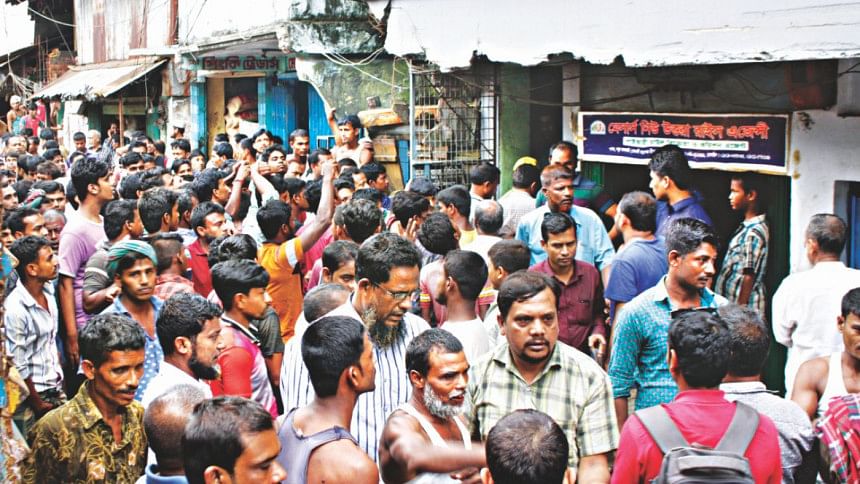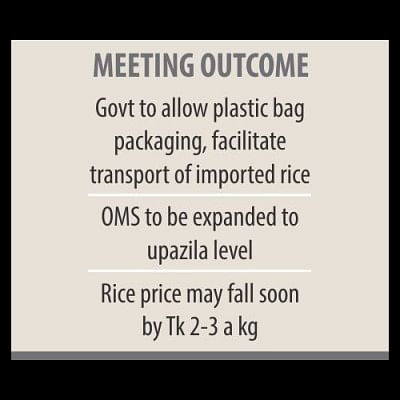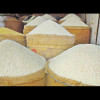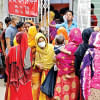Govt wasn't alert to depleting stock

Following a blame game over volatility in the rice market, the government and rice traders reached some decisions yesterday to help rein in the price of the staple that has hit an all-time high.
The decisions include allowing traders and millers to pack rice in plastic bags instead of relatively pricey jute sacks, and expanding the Open Market Sale programme from district to upazila level. Under the OMS, rice is being sold at a subsidised rate of Tk 30.
Rice traders have assured the government of helping reduce the prices by Tk 2 to 3 per kg at the earliest. But they accused the government of pursuing wrong policies all along this season, which contributed to the price spiral.
At a meeting with three ministers at the Secretariat, rice millers and traders said the government was not mindful of its low food stock. It retained a high import duty on rice even after huge crop loss in the haor areas and failed to procure rice from farmers and millers for offering poor price.

On the other hand, the ministers accused rice traders of hiking prices arbitrarily following fake news that India slapped a ban on rice export.
Agriculture Minister Matia Chowdhury, Commerce Minister Tofail Ahmed, Food Minister Qamrul Islam and food officials sat with the traders represented by Bangladesh Rice Millers Association President Abdur Rashid, its General Secretary Layek Ali and several others. Former food minister Muhammad Abdur Razzaque was also present.
At the meeting, Qamrul said his ministry postponed the Tk 10 a kg rice programme for 50 lakh ultra-poor for the time being and would rather go for a wider OMS programme in all upazilas from today.
This time, the government increased the subsidised price of rice to Tk 30 a kg from Tk 15 last year. Yet, the new price is at least Tk 20 a kg lower than the current market price of coarse rice.
Responding to a demand from the traders, Tofail told the meeting that traders would be allowed to pack rice in plastic bags instead of jute sacks.
Traders said the decision would help them reduce rice price by at least Tk 1.5 a kg.
Matia spoke of higher Aus yield this season.
Razzaque said the crop loss this year would be much more than 20 lakh tonnes.
He pointed out that Boro crop was damaged not only by flash floods, but also by fungal attack.
The former food minister also said the government needs to give top priority to the Public Food Distribution System.
Millers' leader Layek Ali said prices of the staple would come down by Tk 2 to 3 a kg very soon, as the government has agreed to allow plastic bag packaging and facilitate transport of imported rice on a priority basis.
Rice traders alleged that the food ministry didn't pay any attention to a fast depleting government food stock and responded late to the urgency of replenishing the rice reserve after the Haor deluge.
They blamed the government for the failure to raise its stock and the delay in reducing the high import duty on rice.
A rice miller from Dinajpur said the government's domestic rice procurement programme in the Boro season failed mainly due to its offer of low price.
"I incurred a loss of Tk 2 crore for providing the government with 7,500 tonnes of rice." Yet, the government didn't increase the purchase price, he claimed.
Traders and millers told the meeting that the government refused to give better price for homegrown rice but it later procured the staple from abroad at much higher prices.
Chitta Majumder, a leading private rice importer, said that if the government had cut duty on rice right after the flash flood-induced crop loss, a situation like this would not have arisen in the first place.
A rice trader from Joypurhat was also critical of the government's foot-dragging in reducing import duty.
“Instead of slashing the import duty at one go, the government did it in phases. And every time the government reduced duty, Indian exporters hiked rice prices."

 For all latest news, follow The Daily Star's Google News channel.
For all latest news, follow The Daily Star's Google News channel. 








Comments